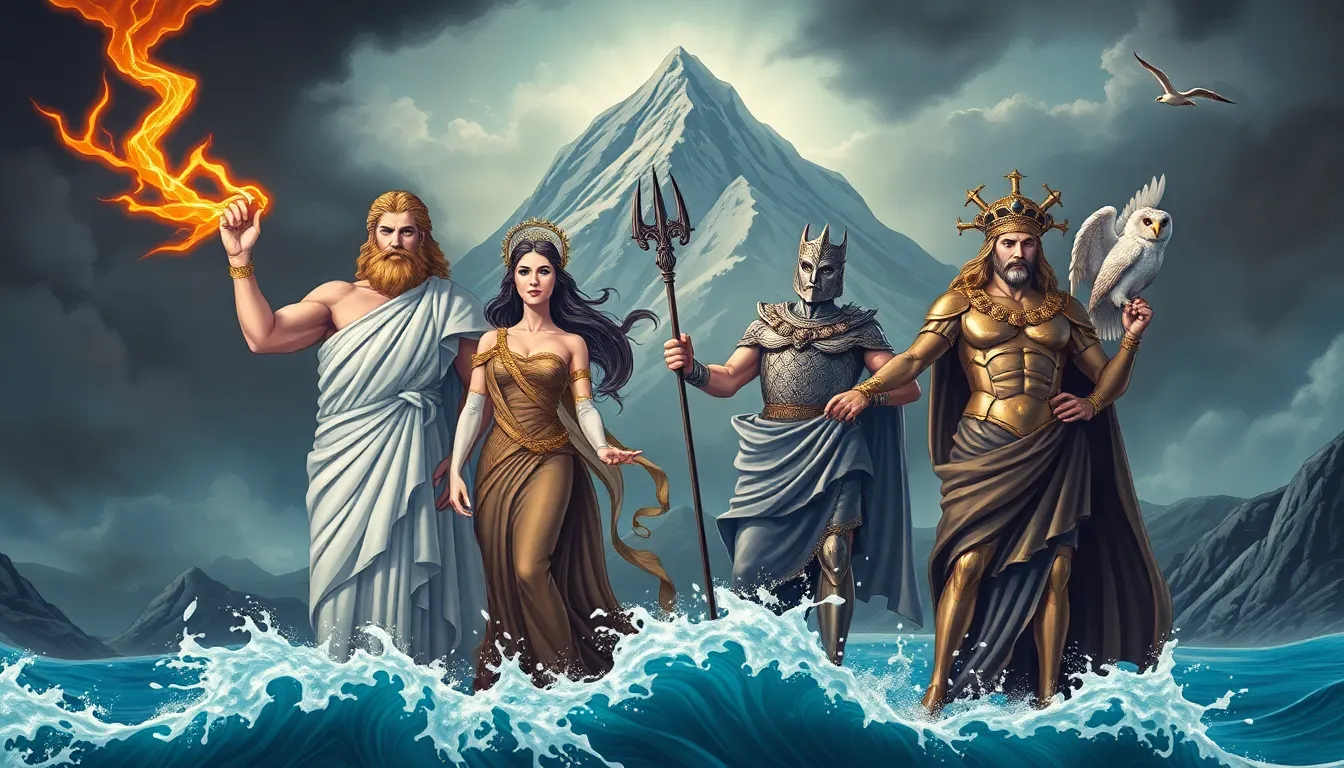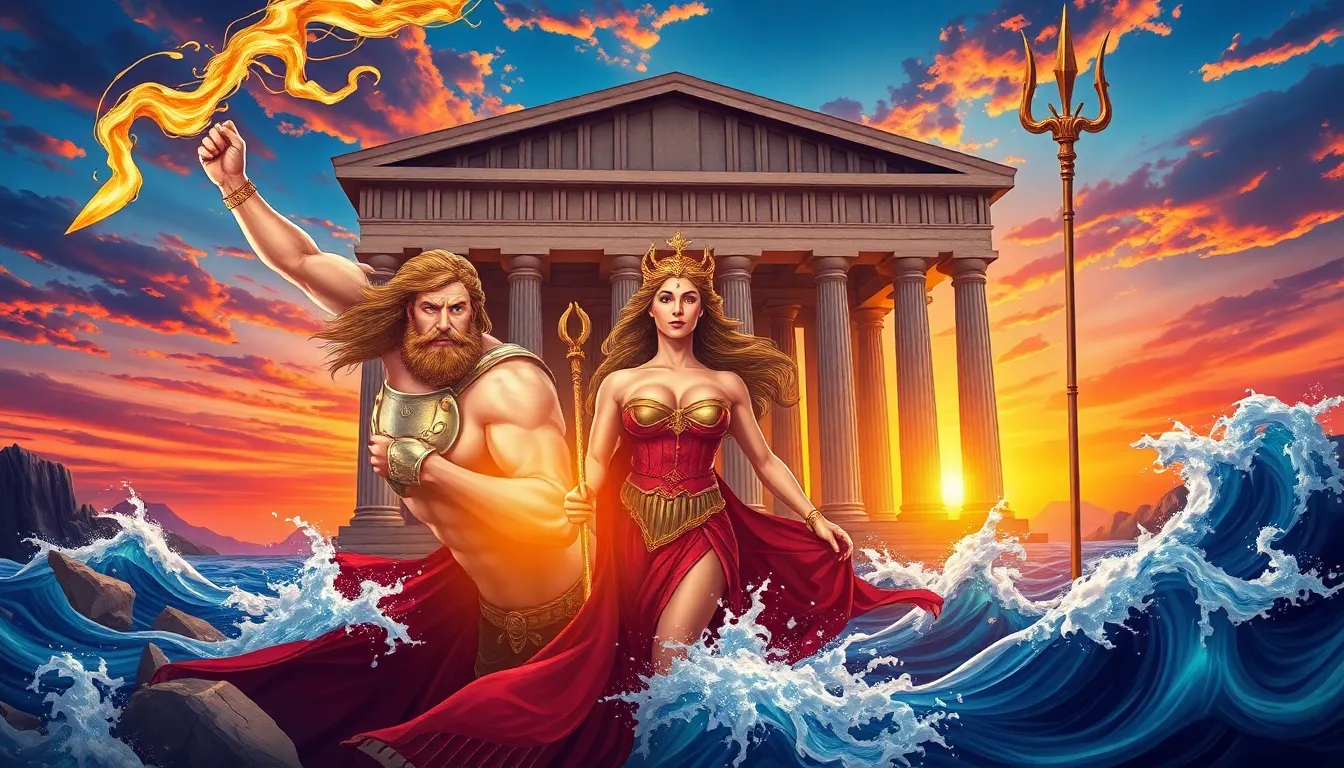In the grand tapestry of mythology, Greek gods and goddesses reign supreme, wielding powers that could make even the most ambitious superhero green with envy. Picture Zeus hurling lightning bolts like a kid with a slingshot or Athena strategizing her way to victory while sipping ambrosia. These divine beings not only shaped the ancient world but also continue to inspire stories, art, and even the occasional Netflix series.
Table of Contents
ToggleOverview of Greek Mythology
Greek mythology encompasses a rich tapestry of stories centered on gods, goddesses, and legendary heroes. Deities like Zeus, the king of the gods, wield immense power over thunder and lightning. Each character possesses unique attributes and capabilities, often representing various aspects of nature and human experience.
Hera, the queen and goddess of marriage, exemplifies loyalty and family but also displays fierce jealousy. Athena, the goddess of wisdom, embodies strategic skills in warfare and is revered for her intellect. Apollo, the god of the sun and music, brings light and harmony, while Artemis, his twin sister, governs the hunt and wilderness.
Mythological tales frequently illustrate the gods’ interactions with mortals, highlighting their strengths, weaknesses, and the complex moral lessons woven throughout these narratives. Stories of heroism often involve demigods like Heracles, who overcomes daunting challenges through sheer strength and determination.
Legends reveal the interplay between fate and free will, making Greek mythology a profound exploration of human nature. The tales of gods and goddesses provide timeless insights, reflecting both the aspirations and fears of ancient societies as they grappled with life’s uncertainties.
Fascination with healing and the arts stems from deities like Asclepius, the god of medicine, who symbolizes the pursuit of knowledge and health. Greek mythology persists in contemporary culture, influencing literature, film, and art, illustrating its enduring appeal across generations.
Major Greek Gods and Goddesses

Greek mythology features a pantheon of powerful deities, each possessing unique abilities and attributes. The following is a closer look at some of the major gods and goddesses, showcasing their roles and powers.
Zeus: The King of the Gods
Zeus reigns as the king of Mount Olympus and the ruler of the gods. He wields the thunderbolt, symbolizing his authority over the sky and weather, and serves as the protector of hospitality and social order. With a reputation for enforcing justice, Zeus often intervenes in mortal affairs, maintaining balance in both divine and human realms. His numerous romances resulted in many offspring, including heroes and other deities, influencing countless myths.
Hera: The Queen of the Gods
Hera stands as the queen of the gods, governing marriage and family. Renowned for her jealousy, she fiercely protects her marriage with Zeus despite his many infidelities. Hera often avenges wrongdoings against herself, showcasing her power in dealing with the mortals that incur her wrath. Additionally, she symbolizes women’s strength and marital fidelity through various myths, highlighting her importance in Greek society.
Poseidon: The God of the Sea
Poseidon holds dominion over the sea, storms, and earthquakes. Known as the Earthshaker, he wields a trident, which allows him to create storms or calm the waters. Sailors prayed to Poseidon for safe passage, understanding his crucial role in maritime endeavors. Many myths depict Poseidon as both vengeful and benevolent, illustrating the duality of his power over nature.
Athena: The Goddess of Wisdom
Athena embodies wisdom, warfare, and strategy. Born fully armored from Zeus’s forehead, she represents intelligence and skill in battle rather than brute strength. The goddess serves as a protector of cities, notably Athens, which honors her name. As a patroness of various crafts and arts, Athena’s influence extends beyond war, enriching cultural practices and promoting knowledge among mortals.
Lesser-Known Deities
Greek mythology features a variety of lesser-known deities, each with unique powers and stories that contribute to the rich tapestry of ancient beliefs.
Hecate: The Goddess of Magic
Hecate holds an influential position as the goddess of magic, witchcraft, and the moon. Often depicted with three faces to represent her dominion over the past, present, and future, she serves as a guide for lost souls. Rituals often invoke her for protection and insight. Associated with darkness and the unknown, Hecate embodies the mystical aspects of life. Many ancient texts link her to necromancy and the protection of home and hearth. Her symbols include the dagger, the key, and the torch, showcasing her connection to transitions and hidden knowledge.
Pan: The God of the Wild
Pan reigns as the god of the wild, shepherds, and flocks. Known for his playful nature, he often wanders through forests playing his pan flute, which enchants all who hear it. His appearance, featuring goat-like horns and legs, emphasizes his connection to nature. Pan embodies the essence of wilderness and rustic music, representing freedom and untamed instincts. Many stories depict his ability to evoke panic in intruders, adding a layer of mystery to his character. Festivals honoring Pan celebrated rustic life, highlighting the importance of nature in Greek culture.
Powers and Abilities of Greek Gods and Goddesses
Greek gods and goddesses possess extraordinary powers that shape both the natural world and human lives. Their abilities reflect the intricate beliefs of ancient societies.
Control Over Nature
Greek deities command the elements with remarkable prowess. Zeus, the god of thunder, unleashes storms and lightning. Poseidon governs the seas, stirring tempestuous waters or granting calm. Demeter, goddess of the harvest, ensures fruitful crops through seasonal cycles. Each deity embodies specific natural forces, illustrating humanity’s deep connection to the environment. The harmony or discord they create influences agricultural success and maritime safety.
Influence on Human Affairs
Deities often intervene in mortal lives, wielding significant influence over human activities. Athena grants wisdom and strategic prowess to heroes, shaping their fates in battle. Aphrodite inspires love and desire, affecting relationships and fortunes. Hera, ruling family and marriage, protects unions while also punishing betrayal. These interactions frequently reveal the gods’ personalities, showcasing their capriciousness or benevolence. Mortals frequently turn to these gods for guidance and assistance, emphasizing the deities’ vital roles in everyday life.
Role in Mythological Stories
Mythological narratives center on the gods and their interactions with heroes and mortals. Each story reveals essential themes such as fate, love, and conflict. For instance, the tale of Heracles highlights his strength and divine parentage, emphasizing the challenges posed by gods like Hera. Similarly, the Odyssey features Athena’s guidance for Odysseus, showcasing her protective nature. These narratives illustrate the gods’ depth, showcasing their abilities while providing moral lessons for society. The complex relationships between deities and humans remain central to Greek mythology’s enduring legacy.
Cultural Impact of Greek Gods
Greek mythology significantly influenced culture across various fields. Literature reflects themes and character archetypes rooted in these ancient tales. Poets and writers often draw inspiration from figures like Zeus and Athena, crafting stories that resonate with contemporary audiences.
Art also showcases the impact of Greek deities. Painters and sculptors frequently depict gods and goddesses, capturing their expressions and attributes. The enchanting beauty of Aphrodite and the fierce strength of Heracles serve as symbols for various human experiences.
Modern cinema and television further illustrate the relevance of Greek myths. Several blockbuster films portray heroic quests and divine interventions that echo ancient narratives. Characters inspired by these figures, such as demigods and mortals, captivate viewers with their complexity and struggles.
Additionally, various fandoms celebrate these stories through books, series, and role-playing games. Enthusiasts explore the intricacies of the gods and goddesses, immersing themselves in their powers and personalities. This engagement allows new generations to appreciate the mythology’s richness.
Cultural festivals often incorporate themes from Greek mythology, emphasizing the legends’ enduring appeal. Communities stage reenactments and celebrations dedicated to the gods, fostering a shared appreciation of ancient traditions. These events encourage exploration of timing, rituals, and the moral lessons contained within the myths.
Greek mythology continues to inspire global culture, permeating diverse aspects of life. The narratives help shape contemporary discussions on morality, ethics, and human experiences. As such, the legacy of Greek gods and goddesses remains relevant and influential, bridging ancient wisdom with modern society.
The legacy of Greek gods and goddesses remains a powerful force in contemporary culture. Their stories of strength wisdom and moral lessons continue to resonate with audiences today. Each deity embodies unique traits that reflect the complexities of human nature and societal values.
From the mighty Zeus to the enigmatic Hecate these figures offer a glimpse into the ancient world’s understanding of fate love and conflict. As modern storytelling evolves the influence of these mythological characters persists inspiring new narratives in literature film and art.
Ultimately the rich tapestry of Greek mythology serves as a timeless reminder of humanity’s quest for meaning and connection. Through these ancient tales the gods and goddesses remain ever relevant inviting exploration and reflection across generations.





